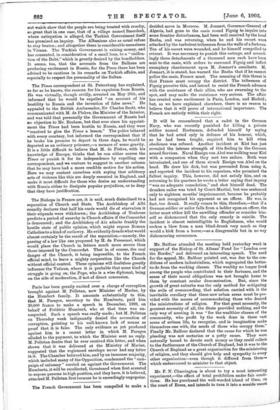The Times correspondent at St. Petersburg has explained, as far
as he knows, the reasons for his expulsion from Russia. He was virtually, though civilly, arrested on May 28th, and informed that he would be expelled " on account of his hostility to Russia and the invention of false news." He appealed to the British Ambassador, Sir Charles Scott, who communicated with M. de Plehve, the Minister of the Interior, and was told that personally the Government of Russia had no objection to Mr. Braham, but that ever since his appoint- ment the Times had been hostile to Russia, and they were "resolved to give the Times a lesson." The police behaved with every courtesy, but informed the correspondent that if he broke his promise to depart in three days, he would be deported as an ordinary prisoner,—a menace of some gravity. It is a little difficult to believe that M. de Plehve, with his knowledge of Europe, thinks that he can either coerce the Times or punish it for its independence by expelling one correspondent, and we venture to suggest in another column that he may have had a more credible motive for his action. Here we may content ourselves with saying that arbitrary acts of violence like this are deeply resented in England, and make it most difficult for those who desire an understanding with Russia either to dissipate popular prejudices, or to deny that they have justification.










































 Previous page
Previous page